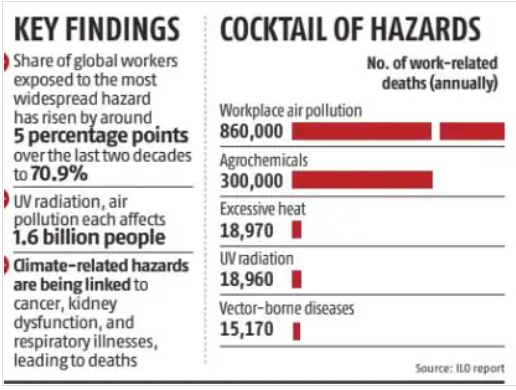News Excerpt:
According to the report entitled "Ensuring Safety and Health at Work in a Changing Climate" by the International Labour Organization (ILO), more than 70% of the global workforce is exposed to risks linked to climate change that cause hundreds of thousands of deaths each year.
Key highlights of the report:
- Workers, especially the world's poorest, are more vulnerable than the general population to the dangers of climate extremes such as heatwaves, droughts, wildfires, and hurricanes.
- As they are often the first exposed, or exposed for longer periods and at greater intensity.
- Farm workers and others carrying heavy labour in hot climates may be exposed to a cocktail of hazards.

- The share of global workers exposed to the most widespread hazard, surging temperatures, has risen by around 5 percentage points over the last two decades to 70.9%.
- Other climate dangers often co-exist, creating a "cocktail of hazards," with UV radiation and air pollution each affecting 1.6 billion people.
- As a worker is likely to be exposed to multiple dangers at once, it is impossible to calculate exactly what portion of the 3.4 billion global workforce is at risk.
- Climate-related hazards are being linked to cancer, kidney disfunction, and respiratory illnesses, leading to deaths or debilitating chronic conditions or disabilities.
- According to the ILO report, air pollution is the most deadly risk, causing some 860,000 work-related deaths among outdoor workers annually.
- Those working in hot indoor environments or poorly ventilated spaces are also at risk.
- Excessive heat causes 18,970 occupational deaths each year, and UV radiation kills 18,960 through non-melanoma skin cancer.
- The greatest impacts will be felt by the working poor, those working in the informal economy, seasonal workers, and micro and small enterprises workers.
- In some cases, the technologies meant to slow climate change, like solar panels and lithium-ion batteries for electric vehicles, can produce new dangers since they contain toxic chemicals.
- As climate change accelerates, governments and employers are struggling to protect employees.
Impact of climate change on workers:
- Almost 23 million occupational injuries attributed to excessive heat are reported each year, costing, on estimate, 19,000 lives annually.
- These numbers do not include the more than 26 million people who live with chronic kidney disease linked to workplace heat stress.
- Furthermore, the impact of global warming on workers goes well beyond heat exposure.
- The ILO noted that numerous dangerous health conditions in workers had been linked to climate change, including cancer, cardiovascular disease, respiratory illnesses, kidney disfunction and mental health conditions.
- The ILO said 1.6 billion workers worldwide were estimated to be exposed to ultraviolet radiation each year, with more than 18,960 work-related deaths annually from non-melanoma skin cancer.
Workplace pollution:
- Another 1.6 billion people were likely to be exposed to workplace pollution, resulting in up to 860,000 deaths among outdoor workers annually.
- More than 870 million agricultural workers are meanwhile likely to be exposed to pesticides, with more than 300,000 deaths attributed to pesticide poisoning each year.
- 15,000 work-related deaths annually are attributed to exposure to parasitic and vector-borne diseases.
Way forward:
- It is essential to heed these warnings. Occupational safety and health considerations must be part of our climate change responses, both policies and actions.
- As the hazards evolve and intensify, it will be necessary to re-evaluate existing legislation or create new regulations and guidance.
- Some countries have improved heat protections for workers, such as Qatar, whose policies came under scrutiny ahead of the 2022 soccer World Cup.
- However, rules to govern other dangers, such as growing pesticide use for agricultural workers, are less common.
- The ILO will host an expert meeting next year with representatives of employers, labour, and governments to discuss the issue and develop fresh policy recommendations.
